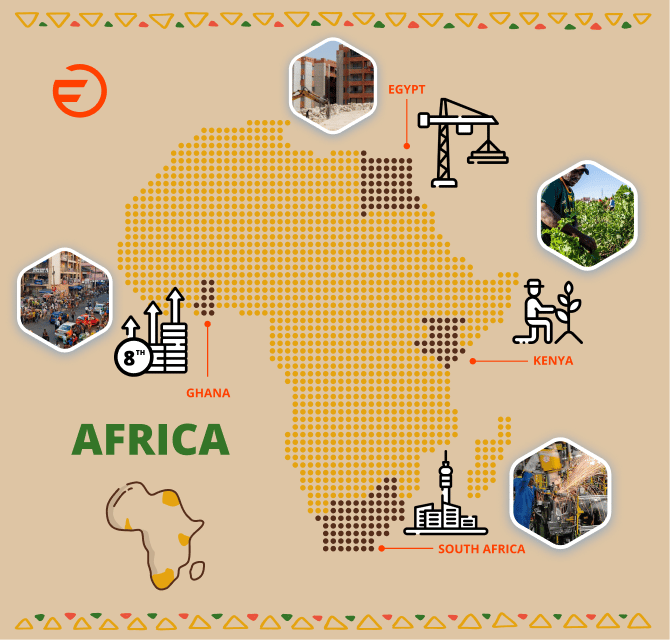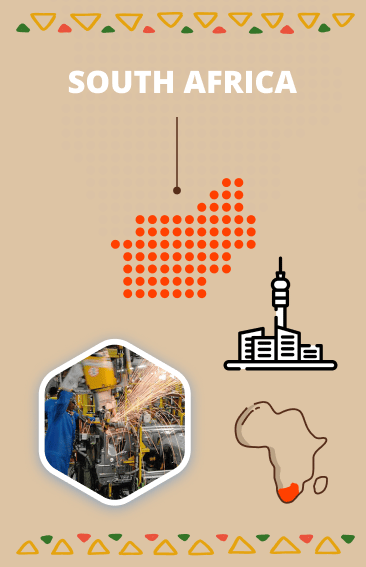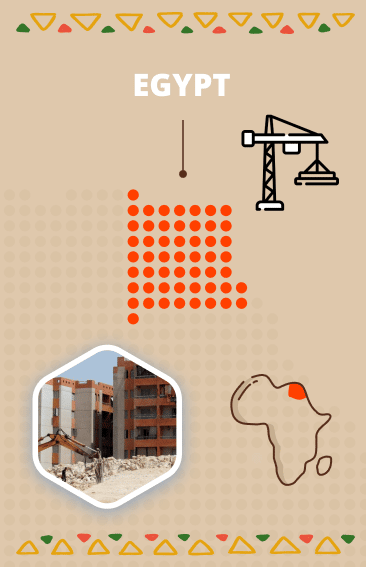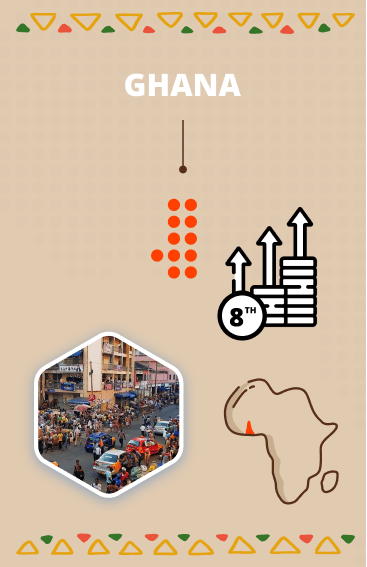4 Fast Growing Markets in Africa
Are you operating globally but still have doubts about investing in Africa?
Are you eyeing Africa for growth opportunities but remain hesitant and concerned about risk?
While you should consider risks in any market around the world, there are also plenty of reasons why expanding your operations to Africa could benefit your business. You should also consider the risk of not entering African markets or entering too late.
Having a strategic game plan for going global and working with the right local partners will help mitigate risk and lead to successful and sustainable growth on the continent.
We invite you to consider the following four African market snapshots and their potential for growth. Then, review our global consulting services to see how we can help you explore going global.

KENYA

What’s hot in Kenya?
- With a GDP of $110 billion, Kenya is the 6th largest economy in Africa. Kenya presents various opportunities for foreign companies in agriculture and agricultural services. Kenya’s agriculture sector has grown tremendously, improving from 16% of GDP in 2009 to 22.4% in 2021. Can your company take advantage of this growth?
- Food development, exports, and local access is still a top issue. The Kenyan government has worked hard to attract foreign agricultural investment from the US, for example the United States-Kenya Strategic Trade and Investment Partnership (STIP), launched in June 2022.
- One main goal of STIP is to facilitate agricultural trade between the US and Kenya, aimed to help ease food security issues and price shocks. The United States Agency for International Development (USAID) has helped materialize some of these goals already. Check it out.
- USAID has worked with Kenya to promote agriculture investment from the private sector in both Kenya and the US. USAID trade links have helped the less-developed Kenyan agricultural sector gain access to the US market, allowing Kenyan farmers to buy high-quality products and equipment as well as livestock/crop development services from the US to boost access.
A risk to consider…
- Price shocks. While Kenya presents a variety of opportunities, Kenya has been hit with price shocks on fertilizer, wheat, and other food imports as a result of the Ukraine-Russia conflict and their decrease in exports. Be prepared to remain flexible on pricing as the conflict continues.
SOUTH AFRICA

Why should you explore South Africa?
- South Africa is one of Africa’s largest growth economies (the “S” in BRICS), ranked 2nd in 2021 behind Nigeria with a GDP of $418 billion. Agriculture, mining, and manufacturing contribute most to the nation’s economic success.
- So if you are working in or service these sectors, with innovative products or services, now is the time to focus on South Africa. The mining sector, in particular, has been wildly successful because of the sheer volume of mineral reserves that exist in the country. Key minerals are used in electric car manufacturing and contribute to broader clean energy initiatives.
- One way South Africa is taking advantage of their mineral reserves is through investment incentives. The Critical Infrastructure Plan (CIP) has been implemented to improve South Africa’s infrastructure (roads, railroads, energy access, etc.) and ultimately lower the cost of harvesting minerals. The CIP attracts investment through providing government grants (some worth up to 30% of development costs) that reduce a significant burden for investors. Companies looking for growth in the South African mineral sector should consider these benefits.
With risk, comes reward. Here’s one risk…
- Costs: One key issue is that, while much of South Africa’s mineral reserves remain untouched, mining remains a capital-intensive business. Setting up the right investment partners will be key to taking advantage of this growing sector (with an estimated $2.5 trillion worth of minerals yet to be mined).
EGYPT

It’s so much more than pharaohs and pyramids…
- Egypt is Africa’s third largest economy, with a GDP of $402 billion as of 2021. Egypt’s manufacturing, agricultural, and real estate sectors have all grown and remained competitive during the pandemic, while the tourism industry saw a significant loss in revenue. As the pandemic eases, new growth opportunities in these sectors are emerging as Egypt reboots business.
- As of May 2022, foreign companies can expedite the process of establishing business in Egypt via a golden license that the Egyptian government selectively grants. In an effort to attract more foreign investment, golden licenses are being offered to companies working in public utilities, infrastructure, new/renewable energy, and transportation.
- By streamlining the establishment of businesses in Egypt, the retail and real estate sectors are growing. With a golden license, building licenses and the allocation of property are more easily accessible, effectively bypassing historically complex routine procedures for foreign investors.
Some risk remains…
- Economic stability. While the Egyptian government launched their new investment services center in 2018 to create a more efficient process for foreign investment, growth was only sustained for a year until the pandemic hit. Since 2019, the country has experienced a 2.3% decrease in GDP.
GHANA

What’s new in Ghana?
- While not in the top growing economies in Africa (ranked 8th), Ghana’s GDP has increased nearly tenfold since 1987. Along with its mining, agricultural, and oil and gas sectors, Ghana’s digital and financial services sectors have showed tremendous growth.
- Ghana is looking to capitalize on its oil and natural gas assets, and is looking for exploration and service partners. In 2007, a large oil deposit was discovered in Ghana’s Jubilee Field, estimated to be worth between $1.5 and $2 billion. Currently, the Ghana National Petroleum Corps (GNPC) is looking for partners that could build infrastructure to sell liquified natural gas (LNG) domestically and to its African neighbors. Barges and trucks as well as pipelines are needed as means to create the most efficient distribution of gas as possible.
- Ghana is also focused on improving it’s energy sector through electricity. In 2014, the Millennial Challenge Corporation (MCC) launched the Ghana Power Compact, which allocated $316 million to help improve the power sector in Ghana. Since then, the MCC has provided reliable and affordable electricity to homes and businesses across Ghana, but a long runway remains. Many of the compact projects have not fully expended their budgets, so government funds remain available to foreign companies capable of executing on these projects.
- There are no legal barriers preventing entry for businesses in Ghana, except the minimum qualifications required by government agencies. Foreign companies seeking to do business in Ghana are expected to do so with incorporated companies or otherwise incorporate their subsidiaries locally. The Ghana Investment Promotion Centre offers additional valuable information.
Inflation risk is a top concern…
- Inflation has been on the rise during the last year, reaching over 30% in July 2022. The Ghanian economy is very susceptible to prices shocks due to its reliance on a few main commodities (gold, cocoa, and oil), among other factors.
SUMMARY
Where to go from here…
Kenya, South Africa, Egypt, and Ghana all present unique growth opportunities if you are operating in the right sector and have the right global strategy. From agriculture and agricultural services, to mining, energy, and even tourism, real opportunities exist for you today to grow your business in Africa.
But, rightfully so, you’re still concerned with how to begin exploring. Doing business in Africa requires the right international business expansion partners and connections to get the ball rolling. If you’d like to continue exploring these opportunities, contact us today so we can discuss our global consulting services, how to get started, and connect you with professionals in the region who know the landscape.
Book a free consultation today and we’ll guide your expansion journey to Africa.
September 1, 2022
Blog
How Professional Development Can Make a Global Impact on Your Team
January 13, 2023


